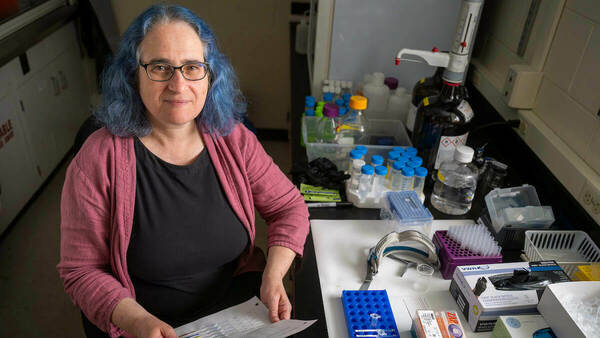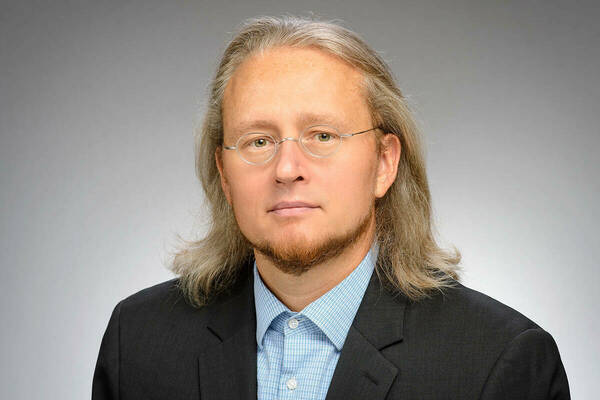Lieberman’s rapid screening card for antibiotics wins 2025 Trinity Challenge
A research team headed by Marya Lieberman, Nancy Dee Professor of Cancer Research in the Department of Chemistry and Biochemistry at the University of Notre Dame, was named joint grand prize winner of the 2025 Trinity Challenge, a global innovation competition dedicated to tackling the growing problem of community access to antibiotics around the world.
Lieberman’s Paper Analytical Device Project (PAD) is a low-cost, rapid screening card that, when paired with a mobile app, allows medical professionals to test antibiotics and determine within seven minutes whether they are substandard or falsified. PADs are designed to be scalable, and used in parts of the world where access to reliable antibiotics remains a major public health challenge.
The other grand prize winning team, led by Yemisi Ogundare, project director for Jhpiego Nigeria, developed Com-WATCH, an integrated, data-driven technology for tracking stock control and identifying substandard and falsified antibiotics in Nigerian communities. The two winners of the Trinity Challenge were selected from 171 applications from 51 countries, and the prize includes an award of £500,000 (approximately 672,000 U.S. dollars) over two years to each winner.
Lieberman’s PADs do not require the use of additional chemicals, solvents, instruments or electricity, and have been proven effective throughout Africa. They identify medications that do not contain the correct chemicals, or the correct amount of chemicals, and they interface with stock control technologies, Lieberman said. The award will allow Lieberman to expand the PAD program to Cameroon, Ethiopia, Kenya, Malawi and Namibia.
“I’m honored and really grateful,” she said. “Antimicrobial resistance threatens us all, because bacteria don’t pay attention to borders.”

The award will allow Lieberman’s lab to test the antibiotics that are most important in treating bacterial infections in community settings in low- and middle-income countries. Ensuring that sick people and animals get good quality antibiotics will protect patients and slow down development of “superbugs,” which are strains of bacteria that become resistant to antibiotics.
“We are interested in building tools that will let people test antibiotics in their own communities,” Lieberman said. “By sharing these rest results across multiple sites, we can increase the impact.”
People in low- and middle-income countries lack access to common antibiotics. Of the 7.75 million who die of bacterial sepsis each year, almost 3 million have infections that could be treated with common oral antibiotics like penicillin and amoxicillin. The lack of access has caused increased antimicrobial resistance, with deaths in both humans and animals.
This year marks the third time the Trinity Challenge has been held. The first, in 2021, was based on pandemic preparedness, and the 2024 challenge was focused on antimicrobial resistance.
“Our new winners from our third challenge have applied innovative thinking to this complex problem in global health, and I applaud their creativity and dedication,” said Professor Dame Sally Davies, executive chair of the Trinity Challenge as well as the UK Special Envoy on antimicrobial resistance, in a news release. “They show that everyone can make a difference and be part of the solution to the antibiotic emergency.
“Their plans to harness the power of new and existing technology and local level data to successfully detect substandard and falsified antibiotics or track stock control within a country will fill knowledge gaps and inform decision-makers.”
This is the second award for Lieberman’s PAD project in 2025. She also received the Gustavus John Esselen Award for Chemistry in the Public Interest in February.
“At Notre Dame, we are driven by a commitment to serve communities and promote human dignity. Professor Lieberman’s PAD project exemplifies those ideals by ensuring access to safe, effective medicines, and this award will allow her to expand its impact to more people who need it most,” said Steve Corcelli, interim William K. Warren Foundation Dean of the Notre Dame College of Science.
Latest ND NewsWire
- Notre Dame to host summit on AI, faith and human flourishing, introducing new DELTA frameworkThe Institute for Ethics and the Common Good and the Notre Dame Ethics Initiative will host the Notre Dame Summit on AI, Faith and Human Flourishing on the University’s campus from Monday, Sept. 22 through Thursday, Sept. 25. This event will draw together a dynamic, ecumenical group of educators, faith leaders, technologists, journalists, policymakers and young people who believe in the enduring relevance of Christian ethical thought in a world of powerful AI.
- Notre Dame Democracy Initiative hosts bipartisan conversation with Western state governorsTwo Western state governors known to work across the aisle on policy issues such as water, housing and energy will visit the University of Notre Dame for a fireside chat about how Western state pragmatism can serve as a model for the country to overcome polarization.
- In new research, Roy Scranton explores climate change and the limits of human progressIn his most recent book, “Impasse: Climate Change and the Limits of Progress,” Scranton, an associate professor of English, defines the impasse he sees as “not only political and institutional, but cognitive, existential and narrative” and asserts that the only path forward is through embracing what he terms ethical pessimism. “A lot of people confuse pessimism with nihilism, apathy and despair,” Scranton said. “But pessimism is actually about recognizing our limits, letting go of unrealistic goals, finding solidarity in the fact of human suffering and doing what you can now, not in some utopian future.
- Notre Dame MBA launches deferred admission programThe Notre Dame MBA Deferred Admission Program allows candidates with little or no work experience, including college seniors, to secure admission before reaching the recommended three years of work experience to enroll.
- ‘Prebunking’ false election claims may boost trust in electionsIn recent years, democracies worldwide have seen a growing erosion of trust in election outcomes and institutions, driven in part by fears of widespread fraud. New Notre Dame research finds that “prebunking” — providing accurate information before false claims spread — boosts trust in elections more effectively than traditional fact-checking.
- ND experts on the canonization of Carlo AcutisAs the Church awaits the ceremony in St. Peter’s Square, where Pope Leo XIV will formally declare Acutis a saint, University of Notre Dame experts Kathleen Sprows Cummings, Brett Robinson and Timothy O’Malley reflect on his life and his path to sainthood.













